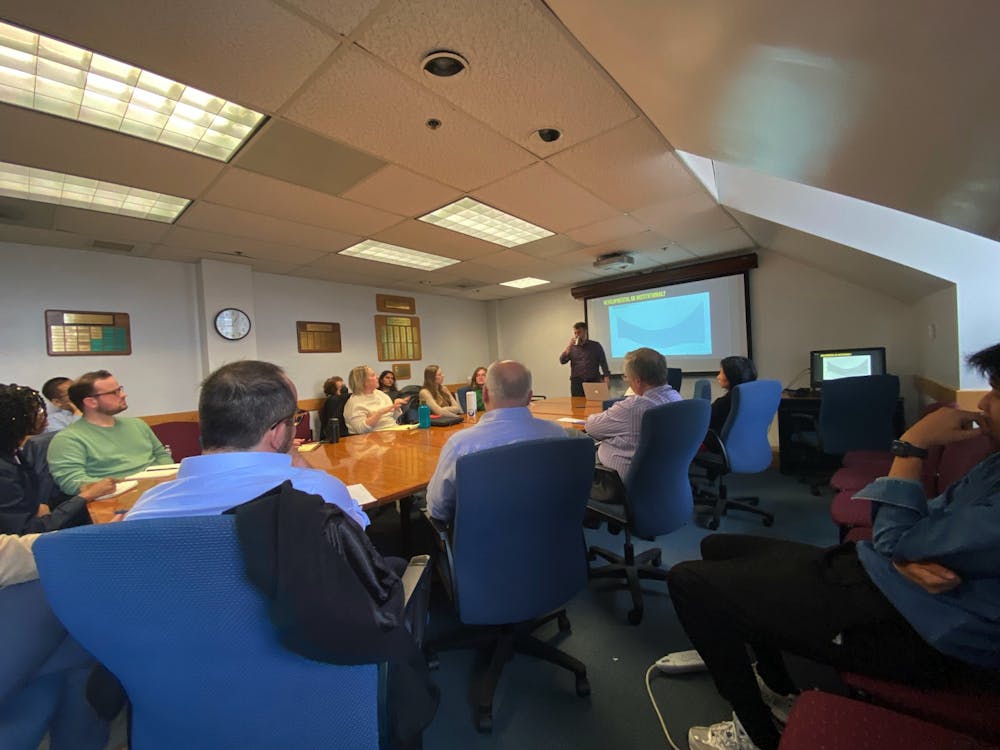Stephen Vaisey, a professor of sociology and political science at Duke University, gave a talk titled "How Common is Opinion Change? Evidence from a 17-Wave Panel Dataset" on Feb. 22. He outlined his framework of cultural change and its connections to the field of sociology.
In an interview with The News-Letter, Emily Agree, a research professor in the Department of Sociology and an organizer of the event, described the importance of Vaisey’s event.
“He uses methods that are often applied to more objective criteria and less often to attitudes,” she said. “He bridges a lot of study that is done to focus on qualitative research... using quantitative research to create objective measures of change.”
Michael Bader, an associate professor of sociology and event organizer, explained how data can be key to understanding social issues in an interview with The News-Letter.
“It matters because we want to understand how change happens,” he said. “It's mostly about individuals changing over time versus different kinds of groups of people coming to some kind of consensus.”
The idea of “cohorts” in cultural change is pertinent to Vaisey’s research on measuring morality and culture. According to Vaisey, cohorts can be measured using three main variables: age effects, period effects and general cohort effects. Vaisey claimed that knowing two of the three variables will reveal the last.
Vaisey also discussed the implications of using a cohort method to calculate societal change in the General Social Survey (GSS). The GSS is a measure of societal trends and attitudes in the U.S., including the extent to which they shift. By using cohorts to measure changes in these attitudes and shifts, sociologists can use panel data to watch individual data changes.
“The first thing I did was I used the GSS panel, and for a brief period... GSS [was] on a rotating panel design, and it had three three wave panels,” he said. “This was extremely exciting to me as somebody who's getting into found data right around this time.”
Vaisey described two ways to measure societal and cultural change. He explained how, in a survey like the GSS, the question of whether to use data from the last question asked or to take the average of two survey results arises.
“[We should take] the average of what they said both times, and the intuition there is, if people are actually changing their mind... then what they said last time should be the best predictor because what they said two times is old news,” he said.
The GSS asks questions about civil liberties, gun laws, trust, sexuality and abortion, race and immigration, and gender.
Vaisey used opinions on gun laws to illustrate a point. Guns are tangible items kept inside the home, and they do not move in and out as ideologies may with time. Therefore, the coefficient of change for opinions of gun laws remains relatively stagnant compared to ideological concepts like civil liberties.
“I love this intuition about the gun owner because they think about a gun [as] a physical item,“ he said. “You can see that this is a good example... basically what it looks like is in [third sample] people are telling you once again, a version of the same thing.”
Vaisey outlined new approaches for measuring opinion change, including taking a socio-psychological approach and the importance of measuring real change versus vacillation.
In an interview with The News-Letter, junior Margaret Tydings commented on her experience at the talk.
“Although Dr. Vaisey is a sociologist, a lot of his work centered around public opinion, and I think that the way he described opinion through sociology was super interesting from a political science perspective,” she said. “He really illustrates what things gain traction culturally.”





